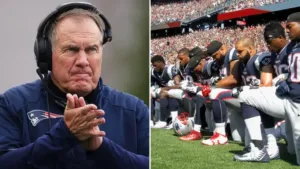
Coach Bill Belichick’s decision to dismiss his team’s captain for kneeling during the National Anthem reignited debates within the NFL and society. Kneeling, initiated by Colin Kaepernick in 2016, was a protest against racial inequality and police brutality.
Firing a player, especially a captain, for non-sporting reasons is unusual in NFL history. Belichick’s decision sparked discussions about personal convictions versus team unity. Sports have often been a platform for political expression, raising questions about consequences for athletes expressing their beliefs on a global stage.
Belichick may have seen kneeling as potentially divisive, jeopardizing team cohesion, a critical factor in professional sports. The decision reflects broader societal divisions over the kneeling movement, amplifying discussions about race, rights, and representation.
Reactions to Belichick’s decision varied within the NFL community, fans, and players from other sports. It prompted debates about athletes’ freedom of expression versus the sport’s integrity.
Bill Belichick’s action will be remembered as one of the NFL’s most controversial moments, emphasizing the intertwined nature of sports, politics, and societal values as society grapples with issues of race and representation.





